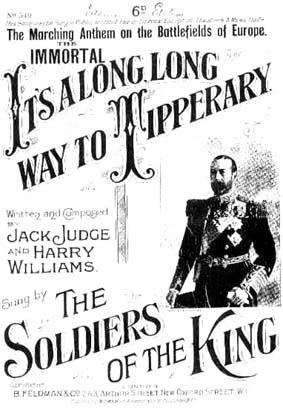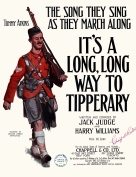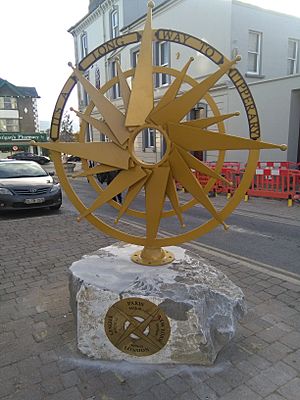It's a Long Way to Tipperary facts for kids
Quick facts for kids "It's a Long Way to Tipperary" |
|
|---|---|

Sheet music cover
|
|
| Song | |
| Published | 1912 |
| Genre | Music Hall, patriotic song, marching anthem |
| Songwriter(s) | Jack Judge and Harry Williams |
"It's a Long Way to Tipperary" (or "It's a Long, Long Way to Tipperary") is an English music hall song first performed in 1912 by Jack Judge, and written by Judge and Harry Williams, though authorship of the song has long been disputed.
It was recorded in 1914 by Irish tenor John McCormack. It was used as a marching song among soldiers in the First World War and is remembered as a song of that war. Welcoming signs, in the referenced town of Tipperary, Ireland, humorously declare, "You've come a long way" in reference to the song.
Contents
Content
The song was originally written as a lament from an Irish worker in London, missing his homeland. Unlike popular songs of previous wars (such as the Boer Wars), it did not incite soldiers to glorious deeds, instead concentrating on the longing for home (as with the period song "Keep the Home Fires Burning").
Lyrics
Up to mighty London
Came an Irishman one day.
As the streets are paved with gold
Sure, everyone was gay,
Singing songs of Piccadilly,
Strand and Leicester Square,
Till Paddy got excited,
Then he shouted to them there:
Chorus
It's a long way to Tipperary,
It's a long way to go.
It's a long way to Tipperary,
To the sweetest girl I know!
Goodbye, Piccadilly,
Farewell, Leicester Square!
It's a long long way to Tipperary,
But my heart's right there.
Paddy wrote a letter
To his Irish Molly-O,
Saying, "Should you not receive it,
Write and let me know!"
"If I make mistakes in spelling,
Molly, dear," said he,
"Remember, it's the pen that's bad,
Don't lay the blame on me!"
Molly wrote a neat reply
To Irish Paddy-O,
Saying "Mike Maloney
Wants to marry me, and so
Leave the Strand and Piccadilly
Or you'll be to blame,
For love has fairly drove me silly:
Hoping you're the same!"
Later performances
The song was featured as one of the songs in the 1951 film On Moonlight Bay, the 1960s stage musical and film Oh! What a Lovely War, and the 1970 musical Darling Lili, sung by Julie Andrews. It was also sung by the prisoners of war in Jean Renoir's film La Grande Illusion (1937) and as background music in The Russians Are Coming, the Russians Are Coming (1966). It is also the second part (the other two being "Hanging on the Old Barbed Wire" and "Mademoiselle from Armentières") of the regimental march of Princess Patricia's Canadian Light Infantry. Mystery Science Theater 3000 used it twice, sung by Crow T. Robot in Mystery Science Theater 3000: The Movie (1996), then sung again for the final television episode. It is also sung by British soldiers in the film The Travelling Players (1975) directed by Theo Angelopoulos, and by Czechoslovak soldiers in the movie Černí baroni (1992).
It is also featured in For Me and My Gal (1942) starring Judy Garland and Gene Kelly and Gallipoli (1981) starring Mel Gibson. It was sung by the crew of U-96 in Wolfgang Petersen's 1981 film Das Boot (the arrangement was performed by the Red Army Choir). Morale is boosted in the submarine when the German crew sings the song as they begin patrolling in the North Atlantic Ocean. The crew sings it a second time as they cruise toward home port after near-disaster.
The cast of The Mary Tyler Moore Show march off screen singing the song at the conclusion of the series' final episode, after news anchor Ted Baxter (played by Ted Knight) inexplicably recited some of the lyrics on that evening's news broadcast.
The song is often cited when documentary footage of the First World War is presented.
In 1916, survivors of the sinking of HMS Tipperary in the Battle of Jutland were identified by their rescuers on HMS Sparrowhawk because they were singing "It's a Long Way to Tipperary" in their lifeboat.
In 1942, as the Japanese hell ship Lisbon Maru was sinking, Royal Artillery POWs trapped in the vessel are reported to have sung the song.
See also
 In Spanish: It's a Long Way to Tipperary para niños
In Spanish: It's a Long Way to Tipperary para niños



